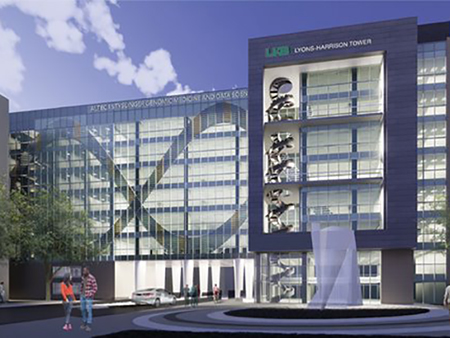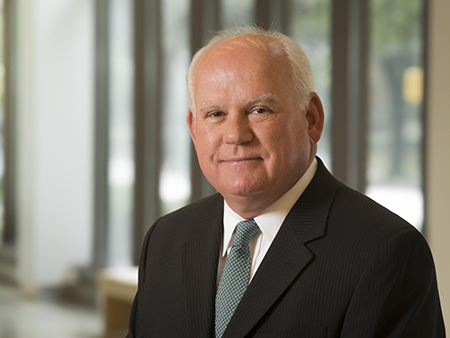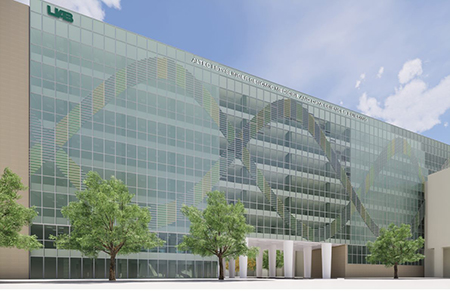 The Altec Styslinger Genomic Medicine and Data Sciences Building will help cement UAB’s place as a leading research institution in genomic and precision medicine.Officials at the University of Alabama at Birmingham and the University of Alabama System say the planned Genomic Medicine and Data Sciences Building at UAB will have a profound effect on the health care of residents of the state and beyond.
The Altec Styslinger Genomic Medicine and Data Sciences Building will help cement UAB’s place as a leading research institution in genomic and precision medicine.Officials at the University of Alabama at Birmingham and the University of Alabama System say the planned Genomic Medicine and Data Sciences Building at UAB will have a profound effect on the health care of residents of the state and beyond.
Gov. Kay Ivey recently announced the project would receive $50 million in state funding from the Public School and College Authority. Jefferson County leaders previously committed $5 million.
“The Altec Styslinger Genomic Medicine and Data Sciences Building represents the future of modern health care, and the combined support from our local and state elected officials and private donors is truly an investment in the lives of every Alabama citizen,” said UAB President Ray L. Watts, M.D. “This facility will accelerate advancements in precision medicine, informatics and data sciences as we gain greater understanding of the roles our genes and the environment play in major human diseases.”
UAB Senior Vice President of Medicine and School of Medicine Dean Selwyn Vickers, M.D., estimates the building will support more than 50 additional leading researchers and 300 research support staff, and an increase of $75 million-$85 million in research funding.
“The facility will be pivotal to recruiting and retaining high-level researchers,” Vickers said. “We are already on the leading edge, but this facility will increase our competitive advantage in supporting researchers who will bolster our local economy.”
UAB leaders say areas of focus will change over time; however, initial programs will include cancer research, neuroscience research, rehabilitation medicine and pediatric research, as well as research into the ongoing COVID-19 pandemic. In addition, the new collaborations will include clinicians serving on the front lines of patient care and enhance translational health initiatives already active at UAB.
“Genomic medicine — personalized medicine — is the future of health care,” said Finis St. John, chancellor of the UA System. “State funding will allow UAB to create a state-of-the-art genomic medicine facility in Birmingham and advance the university’s leadership role in a field that promises to revolutionize health care through its focus on a patient’s genetic makeup. In addition to the governor’s foresight and dedication to this project, this transformational project would not have been possible without the support of our elected leaders and a generous gift from the Altec/Styslinger Foundation.”
 Ray L. Watts, M.D., UAB presidentUAB’s associate dean for Genomic Medicine, Bruce Korf, M.D., Ph.D., says this is the golden age for genomics and precision medicine.
Ray L. Watts, M.D., UAB presidentUAB’s associate dean for Genomic Medicine, Bruce Korf, M.D., Ph.D., says this is the golden age for genomics and precision medicine.
“Genomics has emerged as a major driving force in biomedical research,” Korf said. “Every cell contains genetic information, so genomics cuts across every aspect of medicine and has relevance to all areas of health and disease.”
Korf says the strength of a building dedicated to genomics and data sciences is that it reaches across scientific disciplines and links researchers from different fields who share a common interest in genomics. Collaboration among scientists with different backgrounds and approaches has great potential to yield significant results.
“Genomic approaches have provided powerful tools to diagnose — and recently even to treat — rare disorders due to changes in individual genes,” Korf said. “We are now able to extend this analysis to understand the genomic underpinnings of common disorders such as diabetes and heart disease. The promise of this building, and of the work that will take place within it, is to employ genomics to bring new knowledge of disease risk, and new strategies for prevention and treatment of both rare and common diseases.”
UAB is a recognized leader in genomic and precision medicine. The School of Medicine and the HudsonAlpha Institute for Biotechnology partnered to create the Center for Genomic Medicine in 2014 with the primary mission of conducting research and facilitating translation of research findings into clinical practice.
UAB also established the Hugh Kaul Precision Medicine Institute and the UAB Informatics Institute in 2014. In 2017, UAB and HudsonAlpha received state funding to launch the Alabama Genomic Health Initiative, one of the nation’s first statewide efforts to harness the power of genomic analysis to help identify those at high risk for a genetic disease and provide a basis for continuing research into genetic contributors to health and disease.
The following year, UAB joined the National Institutes of Health All of Us Research Program as the lead institution of the Southern All of Us network. All of Us, a momentous effort to advance individualized prevention, treatment and care for people of all backgrounds, will gather genomic and other data over time from more than 1 million people living in the United States, with the ultimate goal of accelerating research and improving health.
“UAB has assembled a leading team of genomic scientists and researchers in the country,” St. John said. “It has the people and potential to attract an even greater team to Alabama to maintain this position of preeminence. UAB is poised to be the leader in this field in the country and the world. This is a project for the future of all residents of Alabama.”
 UAB is a recognized leader in genomic and precision medicine.“Recognizing this rare opportunity for our state, Chancellor St. John, the University of Alabama System and Board of Trustees made this transformational project a top priority,” Watts said. “We share a great appreciation for Governor Ivey’s affirmation and visionary leadership, along with that of our Jefferson County legislative delegation led by Senators Jabo Waggoner, Rodger Smitherman and Greg Reed, as well as the Jefferson County Commission and our Birmingham business community. This support will allow UAB and Alabama to be a leader in the future of precision medicine.”
UAB is a recognized leader in genomic and precision medicine.“Recognizing this rare opportunity for our state, Chancellor St. John, the University of Alabama System and Board of Trustees made this transformational project a top priority,” Watts said. “We share a great appreciation for Governor Ivey’s affirmation and visionary leadership, along with that of our Jefferson County legislative delegation led by Senators Jabo Waggoner, Rodger Smitherman and Greg Reed, as well as the Jefferson County Commission and our Birmingham business community. This support will allow UAB and Alabama to be a leader in the future of precision medicine.”
The Altec Styslinger Genomic Medicine and Data Sciences Building will house the Hugh Kaul Precision Medicine Institute and the Informatics Institute, along with many of their investigators. The facility will also be home to faculty in translational science and staff from the Bill L. Harbert Institute for Innovation and Entrepreneurship and Office of Sponsored Programs.
The new facility will involve renovation of the existing Lyons-Harrison Research Building, 701 19th Street South on the UAB campus. It will encompass 145,000 square feet of new computational research, research support, office, administrative and scientific collaboration and meeting spaces designed to meet the specific needs of genomics and precision medicine investigators and their programs.
Construction costs are $52.1 million, and the total cost of the project will be $75 million.